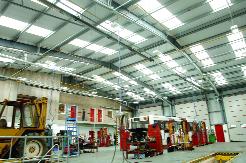Radiant heating scores on whole-life cost analysis

Radiant heating was chosen for this new bus garage in Diss on the basis of whole-life costs.
Following an analysis of whole-life costs for heating its new garage, Simonds, which operates coach and bus services, has chosen an Ambi-Rad radiant-heating system. The company is based at Diss in Norfolk, and engineering director Adrian Tant explains, ‘Taken over the entire life of the heating system, radiant-tube heating worked out considerably cheaper than other forms of space heating. A slightly higher initial investment in the equipment was offset by on-going fuel-cost savings achieved by the economical operation of the heaters.’ Simonds has served the Diss area for 75 years and has amalgamated two service yards in Diss and Botesdale into a single operation on a green-field site. There are six workshop bays, each of which can accommodate two coaches. There is also an MOT testing lane and a body shop. The design of the heating system allows double-decker buses to be elevated on lifts to enable work to be carried out underneath them. The heating system comprises eight AR22 and three AR25 linear heaters in herring-bone configuration. It was installed by Anglia Heating & Ventilation. Five of the heaters have extended reflectors to restrict the powerful heating to a narrower ‘corridor’ to protect buses and coaches, particularly when they are elevated, without reducing comfort for operatives. With up-and-over doors in frequent use, the building is subject to large temperature fluctuations. Radiant-tube heating quickly restores the temperature when the doors are closed.
Related links:


